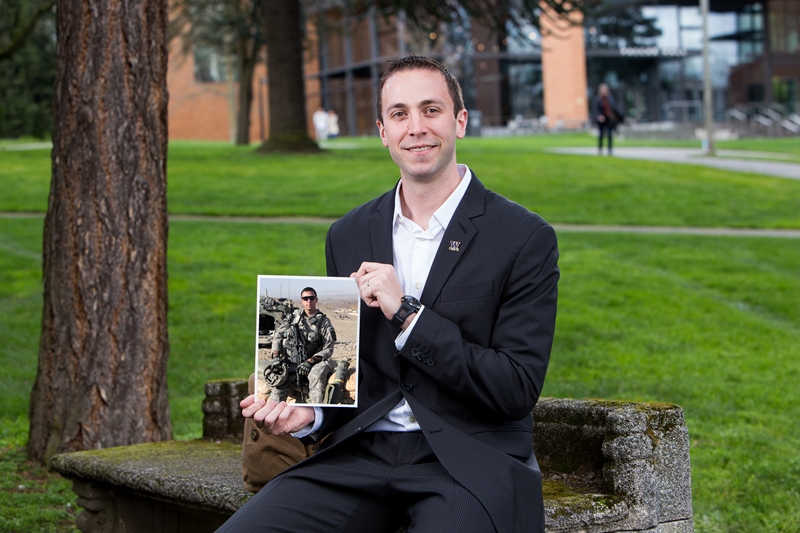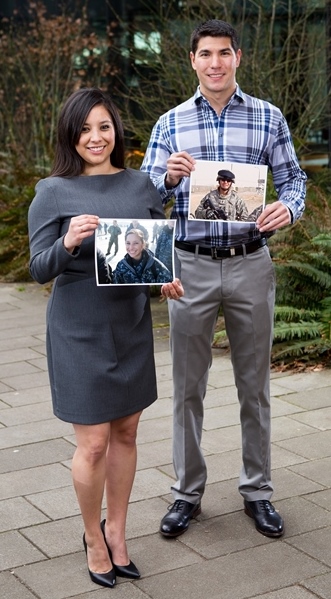Veterans way
A growing company of armed forces vets is choosing the Foster School to transition from military to corporate careers, and the benefits go both ways
Dan Boirum was leading a search-and-destroy operation up the remote Arghandab River valley of Afghanistan when a 100-pound improvised bomb exploded under his armored vehicle, wounding four crewmen, one critically.
The blast knocked Boirum unconscious. But he recovered to resume command of his US Army Stryker platoon and its mission: stabilize this volatile region at the front lines of the war on terror—a task that required a precarious balancing of military might and cultural diplomacy that is perhaps unprecedented in wartime history.
Today, just a few years removed from the dust and dangers of Kandahar Province, Boirum is back in his home town of Seattle, learning to manage in a very different context at the Foster School of Business. His combat experience and leadership credentials aren’t exactly typical at Foster. But he’s hardly alone, either.
In the past few years, a growing cohort of veterans of the United States Army, Navy, Air Force, Marine Corps and Coast Guard have come to Foster, looking to power their transition from military to corporate careers.
“I came to Foster hoping it would give me the ability to learn about the various aspects of business and then give me a path to a new career,” says Boirum, a first-year student in the Full-time MBA Program. “I didn’t come in with a plan. I came knowing that it would be a place where I could figure it out in a safe environment and with all the support I could possibly ask for.”
Back to school
Foster is part of a nationwide surge of military veterans flooding into colleges and universities to plot civilian careers. Recent troop withdrawals and military budget cuts are expected to send 1.5 million service members into the civilian workforce by 2019.
At the same time, the education benefits available to veterans and active duty military have never been better. The largest is the Post-9/11 GI Bill, which covers tuition, books and housing costs.
“The GI Bill made all the difference to me,” adds Matthew Nutsch (TMMBA 2014), a recent graduate of Foster’s Technology Management MBA Program who served in the Navy as an electrician on a nuclear-powered submarine and is now a senior management systems analyst at Seattle City Light . “It’s an amazingly good deal and the TMMBA Program is so dynamic that it would feel wasteful not to take advantage. The education has changed my life.”
Tony Casement, lead counselor at the University of Washington Veterans Center, says that’s a common sentiment: “Instead of getting out and trying to go straight to work, many military vets are taking advantage of the benefits to advance their education and enter the workforce with a better job.”
A great place to restart
It happens that one of the best places to advance that education is the UW. U.S. News & World Report named the UW second nationally in its 2015 ranking of Best Colleges for Veterans.
Casement believes the reasons for the ranking begin with proximity to multiple military bases, including Joint Base Lewis-McChord and the Whidbey Island, Kitsap and Everett Naval Bases. He also factors the university’s generous tuition waivers and other assistance for veterans; a proliferation of military student organizations; and a high-functioning Veterans Center that advises students, offers career counseling, and removes the pain of finding and applying benefits so veterans can focus on their studies.
The university’s sterling international reputation doesn’t hurt, either. “The UW is not only military friendly, but also a great name academically,” Casement adds. “It makes a lot of sense to go here.”
He says that more than 1,500 students at the Seattle campus are receiving some form of military benefit, which is transferrable to dependents. Of that number, around 700 are veterans or active duty service members. And nearly 80 of them are enrolled at the Foster School.
Finding Foster
Casement believes that business is a popular field of study for veterans because it opens doors to so many lines of civilian work, and because many of the management and leadership skills mastered in the military—especially by officers—are transferrable.
This may explain why the largest jump in military enrollment at Foster is occurring in the MBA programs. The Full-time MBA has seen a doubling of veterans and active duty officers in the past couple of years alone.
Why Foster? Start with its reputation and ranking in the upmost echelons of American b-schools. Add its personalized approach to teaching, advising and career services, plus its long tradition of assisting dramatic career transformations.
But the thing that seems to appeal most of all to military veterans is the school’s genuine culture of collaboration. “There is definitely a different culture at Foster,” says Chris Wigley, a second-year MBA who has compared notes with Army buddies studying in MBA programs across the country. “For me, the collaborative environment here has been enormously beneficial.”
It’s familiar territory for anyone who has served in any branch of the military where, as Boirum says, “everything is a collaboration.”
The full package
Collaboration goes both ways. And Foster veterans give as good as they get.
According to Dan Poston, assistant dean for masters programs at Foster, students with military backgrounds add immeasurably to the shared learning environment.
“We’re looking for classes with a diversity of perspectives,” he says. “Military students bring a facility with structure and organization to get things done. These are very positive traits to have in any team. Plus, they share their leadership training, both formally and informally.”
That training is the best in any business, according to Bruce Avolio, director of the Foster School’s Center for Leadership and Strategic Thinking and author of multiple studies on military leadership.
“What you see in our military is what we expect from our leaders in business: authentic, ethical, adaptive, agile role models who focus on development and put collective interest above themselves,” Avolio says. “This comes from a program of training and development that exceeds any business organization in the US or likely on Earth.”
But leadership is not the only asset that veterans bring to the management classroom. Avolio adds that they offer wisdom from having dealt with the most difficult decisions in life. They are comfortable working in hostile environments and ambiguous situations. They have a deep sense of team and self-sacrifice. They appreciate the ultimate importance of ethics. And they bring a learning orientation that challenges others in a respectful way.
Brave new world
So why do they need a business degree? Part of the value is simply in the time and opportunity to figure out what to do with the rest of their lives—especially for people with little work experience or professional network outside of the service.
“It’s hard for military people to start over,” explains Norma Domingo, a former aircraft mechanic in the Navy now studying human resources management in Foster’s Undergraduate Program. “You’ve earned a rank and a name for yourself. But that doesn’t carry over to the civilian world. I’m the same as every other Foster undergrad. We’re all here to start something new.”
Beyond career discernment and the acquisition of technical knowledge in the business disciplines, many veterans use Foster to “demilitarize” themselves, as Ryan McCarthy puts it. “In the Army we wear our rank on our chest, so you always know a person’s level of authority,” says the former artillery officer now pursuing his Foster MBA. “Here in business school and in corporate America, you have to be persuasive without the rank.”
Transferring soft skills is only half the battle. The other half is translation. “Bragging about your accomplishments is frowned upon in the military,” says Wigley. “But when you interview with a company, that’s exactly what you have to do. When you’re not used to telling that story, it can come out raw and unrefined.”
Poston says that Foster’s program staffs and career services excel at helping veterans communicate the assets they bring to any organization: “We help with the meat and the message, framing their experience in a way that has relevance to a recruiter.”
Nested networks
Military and ex-military students at Foster report a kind of sixth sense (or is it radar?) for finding each other in class. Maybe it’s their age. Or something in the way they speak, or carry themselves. Whatever it is, the bond is inescapable, the product of a shared experience, whichever their flavor of military service.
Now Foster vets have a more formal place to find each other. The student-organized MBA Veterans Association is only a few years old, but it’s rapidly evolving from social club to network hub.
The current officers are working with undergraduate leaders to charter a BA chapter of the organization. They are advising prospective students, coordinating with the Husky United Military Veterans organization (HUMV) to create a mentor program, hosting career development and networking events, and connecting with military bases and area employers to develop a military-to-corporate pipeline.
“The MBA Program administrators talk about how we have a golden ticket as a student,” says Veterans Association president Wigley. “I think we have a second golden ticket as veterans. If you reach out to vets at all kinds of companies, they’re usually more than willing to help.”
An old habit that dies hard.
Dan Boirum describes the connection between veterans in familial terms. He recalls suiting up for an interview with Liberty Mutual when a couple of classmates stepped in to perform an informal class A uniform inspection—even swapping watches so he’d look sharper. “It was just an instinctive thing,” he says. “Your buddy is going into an important meeting, so we’ll look you over, straighten you up. There’s a definite brother/sisterhood here—all within the larger Foster family.”
Passion and purpose
That’s the ultimate expression of the Foster student experience.
Matt Pescador, an executive officer in his 20th year with the Navy, enrolled in Foster’s Executive MBA Program preparing for an eventual second career, ideally at a comparable level of seniority. What he’s found is the definition of a symbiotic relationship. And endless inspiration.
“I have deep experience in leadership, and the executives in my program bring a fast-paced technocracy that I’m not familiar with,” he says. “The relationship between what they learn from me and what I learn from them is exactly what the program is trying to foster.”
For Boirum, those relationships—with people from every background who share a genuine passion—are the keys to his transformation to a successful and meaningful civilian life.
“When you transition out of the military, one of the things you’re most concerned about is finding another place where you belong, where there is a shared sense of purpose to make the world a better place. I was afraid that I’d leave the Army and be lost,” he says. “But at the Foster School I’m surrounded by people who want to be part of something special together, something bigger than themselves. I never feel lost here.”
The version of this article that appears in the spring 2015 issue of Foster Business includes profiles of six additional Foster veterans.


